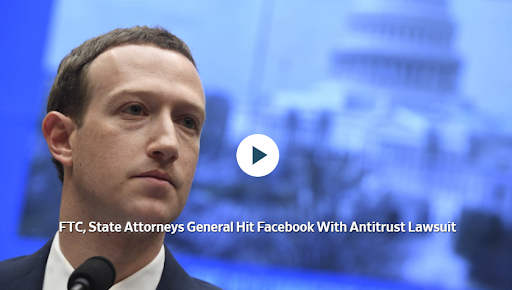New Google Ads Brand Report
Google has quietly introduced a powerful tool for advertisers: the
Read More
Benjamin Franklin famously said, “Our new Constitution is now established, everything seems to promise it will be durable; but, in this world, nothing is certain except death and taxes.”
If he could, Mr. Franklin would amend that list to include, “death, taxes, and every company with hopes of success, marketing through Google and Facebook.”
At the Attorney Marketing Network, we know how powerful both media giants are when it comes to creating successful solutions for our client’s online marketing needs.
So does the Federal government.
In October 2020 and December 2020, two separate branches of the U.S. Federal Government has notified Google and Facebook, respectively, that they are being sued for monopolistic operations.
While both lawsuits will not affect everyday lives for years to come, each company may attempt to make good faith efforts to minimize their exposure in the courtroom.
Will that affect your law firm’s marketing? Greatly.
Here’s why.

In October 2020, the U.S. Department of Justice filed a civil antitrust lawsuit to “stop Google from unlawfully maintaining monopolies through anticompetitive and exclusionary practices in the search and search advertising markets and to remedy the competitive harms.”
Google processes approximately 90% of all online searches in the United States, which is exactly where your clients live, work, and search for attorney services.
Their massive advertising business — one in which attorneys avidly participate — generates nearly all their $160 billion in annual sales.
The DOJ, citing the Sherman Act, asserts these anticompetitive practices harm not just innovative new companies from competing with Google, but also consumers by lessening their choices.
Other alleged monopolistic activity outlined in the DOJ’s complaint includes:
So, what does Google has to say about these allegations?
Google says it “developed, continually innovated and promoted” its search product as part of its mission to “organize the world’s information and make it universally accessible and useful.”
They say people use its services because they choose to, not because they lack alternatives.
Further, their purchase of default space on mobile devices is akin to buying preferable shelf space in a supermarket.

Google isn’t the only media giant in the government’s crosshairs.
The Federal Trade Commission accused the social media powerhouse, Facebook, of purchasing rising rivals to cement its dominance in the industry.
According to the FTC’s complaint, “Facebook is the world’s dominant personal social networking service and has monopoly power in a market for personal social networking services.”
The Federal Trade Commission alleges “Facebook has engaged in a systematic strategy—including its 2012 acquisition of up-and-coming rival Instagram, its 2014 acquisition of the mobile messaging app WhatsApp, and the imposition of anti-competitive conditions on software developers—to eliminate threats to its monopoly.”
The FTC claims their unmatched position has led to staggering profits, including the over $18.5 billion of their $70 billion in revenue last year.
With more than two billion users, the FTC’s concerns deepen, as they allege Facebook is depriving advertisers of the benefits of competition, stating their extraordinary network and data advantages create huge barriers to new social media entrants.
Although we are years away — with the first hearing for the Google antitrust lawsuit scheduled for 2023 — from forced changes that attempt to level the online marketing playing field, there could be some changes forthcoming that will affect how attorneys market their services online.
They may include:
If Google must compete more evenly with other search engines, Google Algorithm may revert to natural, AI-driven language use, which allows other search engines to adapt more easily.
Radical changes to how SEO is done could change the landscape of how your attorney content is developed and optimized.
As consumers, it would be great to see fewer ads as we search for, say, a new lamp online.
For advertisers, the decreased Google ads could be a nightmare.
The PPC advertising or pay-per-click advertising landscape would become more competitive — which may mean more expensive.
Although, this could go either way.
Google currently captures one-third of every online advertising dollar spent, so new search engine technology may potentially allow new players to offer their advertising services at a fairer-market price, which could force Google to do the same.
Google controls the existing PPC and keyword costs across its multiple platforms, including search, maps, and YouTube. If the lawsuit is successful, and the control is relinquished, advertisers may lose access to scalable advertising, which drives their marketing campaigns.
For now, all anyone — us included — can do is speculate about the future of both these important antitrust lawsuits. In the meantime, we will keep anticipating all scenarios related to our clients’ online marketing success, and pivot accordingly in real-time.
If you have questions about your existing attorney marketing campaign, or would like to explore new opportunities, contact us today to learn more about our strategies, so you can stay ahead of the competition.